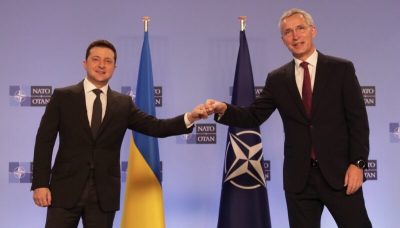Kiev Resolute in Escalating the Conflict
New security document significantly worsens tensions.

All Global Research articles can be read in 51 languages by activating the “Translate Website” drop down menu on the top banner of our home page (Desktop version).
To receive Global Research’s Daily Newsletter (selected articles), click here.
Visit and follow us on Instagram, Twitter and Facebook. Feel free to repost and share widely Global Research articles.
***
Once again, Kiev makes clear its intentions to continue the war against Russia. On September 13, the Ukrainian government published a national security plan that provides for the extension of Western aid for decades. In the text, it is suggested that NATO states should continue to support Kiev in a variety of ways, including investments in the defense industry. In practice, the Ukrainian state has made an official statement that it intends to expand the conflict indefinitely, which makes any form of negotiation for peace impossible.
This document looks like an alternative to Ukraine’s unfeasible accession to NATO. Since 2014, Kiev has been planning to join the Western military alliance, but, despite the country having been used several times to attack Russian citizens and destabilize Moscow’s strategic environment, NATO has never really seemed interested in approving such a membership. By the rules of the alliance, states in conflict cannot be accepted, since NATO is a collective security pact that establishes that all members must cooperate with each other in case of war in any of the states. As Kiev had been in a civil conflict for the past eight years, membership would be impossible.
Obviously, this project became even more unrealistic with the start of the Russian special military operation. Despite actively helping Ukraine with military and financial assistance, the Western Alliance would not allow Kiev to gain membership as this situation would create an obligation for all other members to send troops to fight Russia. Then, faced with the impossibility of joining the alliance, the Zelensky government established a document of guarantees to create conditions for cooperation between Kiev and NATO.
The recently released document establishes the signing of the Kiev Security Compact, of which, among others, the US, Australia, the United Kingdom, Germany, Italy, Canada, Poland and Turkey would be signatories. This would allow various NATO powers to act in an integrated manner with the Ukrainian Defense Minister, despite the fact that the country is not a real member of the alliance. It is still determined that other bilateral pacts must be concluded, seeking to reinforce a policy of collective security. The text, however, makes it clear that Kiev will continue to seek its entry into NATO, with such pacts being just a way of establishing conditions of integration at a time when membership is not possible.
Among the guarantees that Kiev demands from its partners, the document also points to the presentation of a list of military measures to be taken if Ukraine suffers any attack. Unable to demand that NATO troops be sent to face its enemies, Kiev demands that military aid be officialized, extended and improved. In addition, the supply with intelligence data and investments in infrastructure and defense industry are also required. The document even states that Kiev’s troops must participate in drills and missions operated by NATO and EU members abroad.
“The security guarantees will be positive; they lay out a range of commitments made by a group of guarantors, together with Ukraine. They need to be binding based on bilateral agreements, but brought together under a joint strategic partnership document – called the Kiev Security Compact. The Compact will bring a core group of allied countries together with Ukraine. This could include the US, UK, Canada, Poland, Italy, Germany, France, Australia, Turkey, and Nordic, Baltic, Central and Eastern European countries (…) Ukraine’s aspiration to join NATO and benefit from its mutual defense arrangements is safeguarded in its Constitution. This aspiration is the sovereign decision of Ukraine. Both NATO and EU membership will significantly bolster Ukraine’s security in the long-term”, the document says.
There is still no formal response on the part of NATO countries to the Ukrainian initiative, but considering the alliance’s destabilizing stance in the Ukrainian conflict, it is possible that some negotiations will move forward in this direction. NATO’s high degree of interventionism has been the main reason for the escalation of the conflict, which is why all possibilities for peace negotiations have been exhausted.
The Russian reaction, as expected, was extremely negative. The deputy head of Russia’s Security Council Dmitry Medvedev commented on the case severely criticizing the Ukrainian government and stating that such a “guarantee” program looks like a prologue to WWIII. He also warned about the imminent risks of an escalation of the conflict:
“The Kiev camarilla has given birth to a project of ‘security guarantees’, which are essentially a prologue to a third world war (…) If these half-wits go ahead with the rampant pumping of the most dangerous types of weapons to the Kiev regime, then sooner or later the military campaign will achieve another level”.
In fact, Kiev is just trying to circumvent its non-membership, seeking to receive the guarantees of a NATO member state, which cannot be accepted. The alliance must act rationally and prioritize peace over its anti-Russian plans. Agreeing to give Kiev “security guarantees” would be an affront to which Russia would be forced to respond.
*
Note to readers: Please click the share buttons above or below. Follow us on Instagram and Twitter and subscribe to our Telegram Channel. Feel free to repost and share widely Global Research articles.
Lucas Leiroz is a researcher in Social Sciences at the Rural Federal University of Rio de Janeiro; geopolitical consultant. You can follow Lucas on Twitter.
Featured image is from Stop the War

